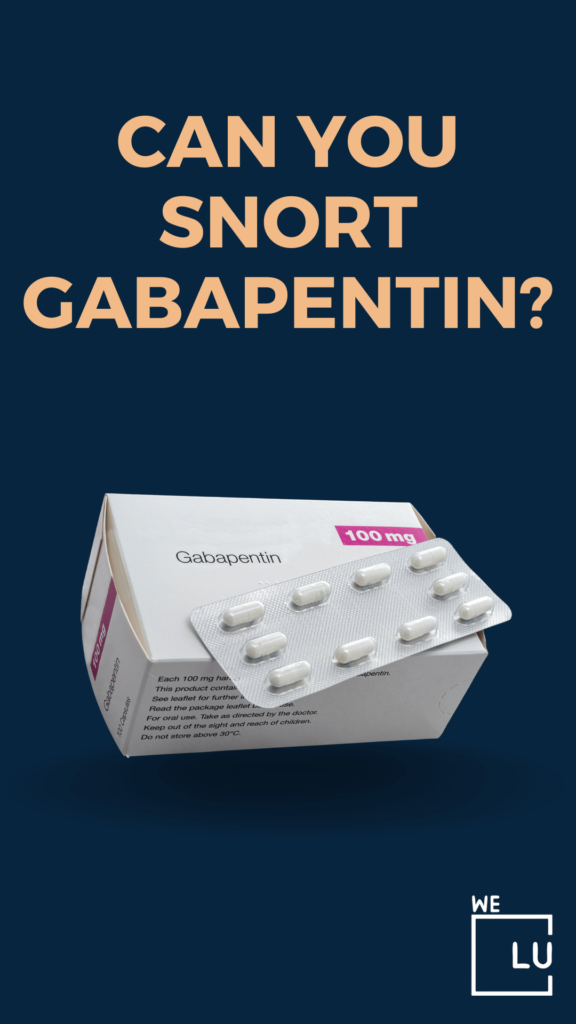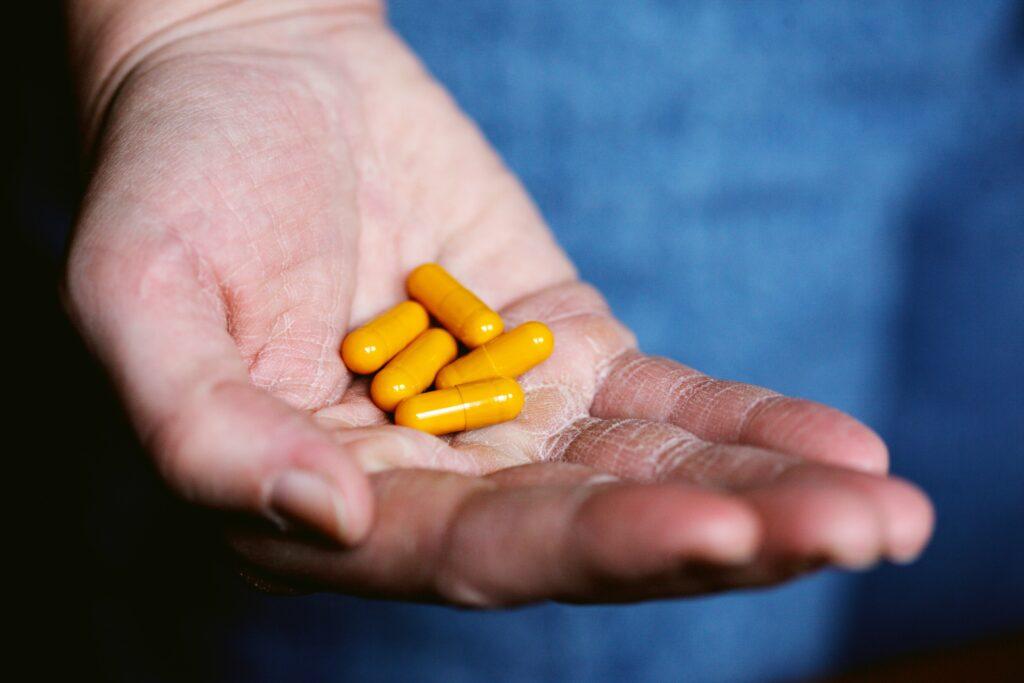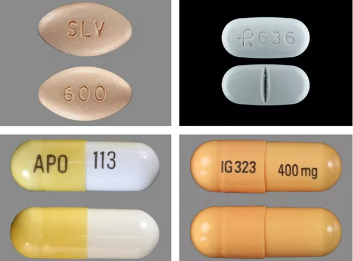Is Gabapentin a Narcotic? Overview
Regarding medications like Gabapentin, many questions often arise, especially regarding its classification, uses, and potential side effects. “Is Gabapentin a Narcotic?” is a common question many individuals have, and this article aims to provide comprehensive insights into the nature of Gabapentin, its various uses, potential side effects, and whether it falls under the category of narcotics. Whether you’re considering Gabapentin as a treatment option or are simply curious about its properties, this article will help you navigate the facts and dispel any misconceptions.
Consider Gabapentin as a viable option for managing withdrawal symptoms at We Level Up Treatment Center.
Uses of Gabapentin Narcotics
Gabapentin is not classified as a narcotic; instead, it is an anticonvulsant medication. However, it is used for various medical conditions. Here are some common uses of Gabapentin:
- Epilepsy: Gabapentin is primarily prescribed to manage and control epileptic seizures. It can be used alone or with other antiepileptic drugs to help prevent seizures in individuals with epilepsy.
- Neuropathic Pain: Gabapentin is often prescribed to alleviate neuropathic pain resulting from diabetic neuropathy, postherpetic neuralgia (shingles), and nerve injuries. It works by modulating pain signals in the nervous system.
- Anxiety Disorders: In some cases, Gabapentin may be used off-label to help manage anxiety disorders, mainly when other medications are ineffective or have undesirable side effects.
- Restless Leg Syndrome (RLS): Gabapentin can relieve the discomfort and restless sensations associated with RLS. This neurological disorder causes an uncontrollable urge to move the legs, usually when at rest.
- Migraine Prevention: Some individuals with chronic migraines find relief with Gabapentin as a preventive medication. It is not a first-line migraine treatment but may be considered when other options fail.
- Fibromyalgia: In some instances, Gabapentin may be prescribed to manage the pain and discomfort associated with fibromyalgia, a chronic condition characterized by widespread musculoskeletal pain and tenderness.
- Off-Label Uses: Gabapentin is sometimes used off-label to help manage various conditions, such as alcohol withdrawal, bipolar disorder, and certain types of pain not responsive to other treatments.
It’s essential to note that Gabapentin should always be under the guidance and prescription of a qualified healthcare professional. Additionally, its effectiveness and potential side effects can vary from person to person, so individualized medical advice is crucial when considering Gabapentin for any purpose.

Skip To:
Learn More:
- Is Gabapentin Addictive? Signs, Overdose, Withdrawal & Treatment. How Addictive is Gabapentin? Is Gabapentin an Addictive Drug?
- Can You Snort Gabapentin?
- Gabapentin Withdrawal Symptoms, Timeline, & Treatment
- Guide to Gabapentin Addiction. Is Gabapentin Addictive? Gabapentin Side Effects, Uses, Dosage, Interactions & Abuse.
Gabapentin Narcotics Fact Sheet
Gabapentin Abuse Overview
Gabapentin abuse is the misuse or overuse of medication for non-medical purposes. This can include taking higher doses than prescribed, taking the medication more frequently than directed, or using it without a prescription.
Gabapentin abuse can lead to adverse physical and mental health effects, including addiction, withdrawal symptoms, and overdose. It is crucial to use gabapentin only as directed by a healthcare provider and to seek help if you or someone you know is struggling with gabapentin abuse.
Gabapentin Abuse Treatment
Gabapentin abuse can be treated with medication-assisted treatment, behavioral therapy, and support groups.
Treatment plans are tailored to the individual and may include detoxification, medication management, and counseling to address underlying issues related to substance abuse.
Gabapentin Side Effects
Gabapentin is a medication commonly prescribed to treat various medical conditions, such as seizures, neuropathic pain, and anxiety disorders. While it is generally considered safe and effective, there are some potential side effects to be aware of, including:
- Dizziness or drowsiness.
- Fatigue or weakness.
- Nausea or vomiting.
- Headache.
- Dry mouth.
- Swelling in the extremities.
- Mood changes or depression.
- Difficulty speaking or slurred speech.
- Coordination problems.
- Memory or concentration difficulties.
- Unusual eye movements.
- Allergic reactions.

Get Your Life Back
Find Hope & Recovery. Get Safe Comfortable Detox, Addiction Rehab & Dual Diagnosis High-Quality Care.
Hotline(844) 597-1011Gabapentin Narcotics Statistics
The use and abuse of medications, particularly those with the potential for misuse, is a critical concern in healthcare and public health. While Gabapentin itself is not a narcotic, it has garnered attention due to its potential for misuse and abuse when used inappropriately. Understanding the statistics related to Gabapentin and narcotics is essential for healthcare professionals, policymakers, and the general public to address this issue effectively. In this article, we will explore some key statistics and examples related to Gabapentin and its association with narcotics.
- Rising Prescription Rates: Gabapentin’s prescription rates have surged in recent years. According to the National Institute on Drug Abuse (NIDA), between 2012 and 2016, the number of prescriptions for Gabapentin increased by 64%, reflecting a growing clinical interest in its therapeutic potential.
- Off-Label Use: One significant concern is the off-label use of Gabapentin. A study published in the Journal of the American Medical Association (JAMA) noted that over 90% of Gabapentin prescriptions are for off-label uses, which may include pain management and anxiety. This highlights the need for further research into its efficacy and potential risks for these applications.
- Misuse and Diversion: While Gabapentin is not classified as a controlled substance, it has been associated with misuse and diversion. A study in the journal Addiction found that among individuals with opioid use disorder, almost 15% reported Gabapentin misuse. This misuse often involves taking higher-than-prescribed doses to achieve a euphoric effect or enhance other substances’ effects.
1.6 million
The number of individuals using promethazine in the United States increased from 1.6 million in 2002 to 3.9 million in 2015.
Source: JAMA Internal Medicine
119%
There was a 119% increase in emergency department visits related to promethazine misuse or abuse between 2013 and 2017.
Source: SAMHSA
2 million
In 2019, an estimated 2 million individuals in the United States aged 12 or older misused promethazine at least once in their lifetime.
Source: National Survey on Drug Use and Health
Is Gabapentin Considered a Narcotic?
Gabapentin is not considered a narcotic or opioid. It belongs to a different class of medications known as anticonvulsants or antiepileptic drugs. Narcotics, also known as opioids, are a group of drugs derived from opium or synthesized to have similar effects on the central nervous system. These drugs include substances like morphine, heroin, oxycodone, and fentanyl, and they are primarily used for pain relief.
Gabapentin, on the other hand, was originally developed to treat epilepsy and is primarily used for controlling seizures. Its mechanism of action involves modulating neurotransmitters and calcium channels in the nervous system, which helps reduce pain and control seizures. While Gabapentin has been found to be effective in managing various types of pain, especially neuropathic pain, it does not produce the same euphoric effects or physical dependence associated with narcotics.

Key points about why Gabapentin is not considered a narcotic:
- Different Mechanism of Action: Gabapentin’s mode of action is distinct from narcotics, which primarily act on opioid receptors in the brain. Gabapentin’s effects are mediated through different pathways.
- Lower Risk of Dependence: Gabapentin generally has a lower risk of physical dependence and addiction than narcotics. It is not classified as a controlled substance in most jurisdictions.
- Prescription Medication: Gabapentin is available only by prescription and should be used under the guidance of a healthcare professional. It is commonly prescribed for conditions such as epilepsy, neuropathic pain, and certain anxiety disorders.
- Off-Label Uses: While Gabapentin is not a narcotic, it has been prescribed off-label for various conditions, including fibromyalgia, restless leg syndrome, and certain mood disorders. Its efficacy for these off-label uses is a subject of ongoing research.
- Side Effects: Gabapentin can have side effects, including dizziness, drowsiness, and coordination problems, but these side effects are generally not as severe or life-threatening as those associated with narcotics.
In summary, Gabapentin is not considered a narcotic because it does not belong to the opioid class of drugs and does not produce the same effects or risks associated with narcotics. It is essential to use Gabapentin as a healthcare provider prescribes and be aware of its potential side effects while recognizing its value in treating specific medical conditions.
Side Effects of Gabapentin Narcotic
Gabapentin is not classified as a narcotic or opioid; it is an anticonvulsant medication primarily used to treat epilepsy and neuropathic pain. However, like any medication, it can have side effects. Here are some common side effects associated with Gabapentin:
- Dizziness: Many people taking Gabapentin may experience dizziness, especially when first starting the medication or when the dosage is increased. Using caution when operating heavy machinery or driving if you experience dizziness is essential.
- Drowsiness: Gabapentin can cause drowsiness or sedation in some individuals. This side effect can impact daily activities, so taking the medication before bedtime is often recommended.
- Coordination Problems: Some people may experience difficulty with coordination or problems with balance while taking Gabapentin. This can increase the risk of falls or accidents.
- Fatigue: Feeling tired or fatigued is a common side effect of Gabapentin, and it may affect your ability to concentrate or perform tasks that require mental alertness.
- Nausea and Vomiting: Gabapentin can occasionally cause gastrointestinal side effects, such as nausea and vomiting. Taking the medication with food may help alleviate these symptoms.
- Swelling: Swelling of the extremities, particularly the ankles and feet, can occur in some individuals taking Gabapentin. This side effect should be reported to a healthcare provider.
- Mood Changes: While less common, some individuals may experience mood changes, including increased irritability or mood swings, while on Gabapentin.
- Skin Reactions: Rarely, Gabapentin can cause skin reactions such as rash or hives. If you notice any unusual skin changes, consult your healthcare provider immediately.
- Weight Gain: Weight gain is another potential side effect, although it is not experienced by everyone taking the medication.
It’s important to note that the side effects of Gabapentin can vary from person to person, and not everyone will experience them. Additionally, the severity and occurrence of side effects may depend on the dosage and duration of Gabapentin use.
While Gabapentin is not a narcotic or opioid, it is a prescription medication, and any concerns about side effects or its use should be discussed with a healthcare provider. It’s crucial to take Gabapentin as prescribed and follow your healthcare provider’s recommendations for monitoring and managing potential side effects. If you believe you are experiencing side effects that are severe or bothersome, consult your healthcare provider for guidance.
Get Help. Get Better. Get Your Life Back.
Searching for Accredited Drug and Alcohol Rehab Centers Near You?
Even if you have failed previously and relapsed, or are in the middle of a difficult crisis, we stand ready to support you. Our trusted behavioral health specialists will not give up on you. When you feel ready or just want someone to speak to about therapy alternatives to change your life call us. Even if we cannot assist you, we will lead you to wherever you can get support. There is no obligation. Call our hotline today.
(844) 597-1011Gabapentin Narcotic Class
Gabapentin does not belong to the narcotic or opioid class of medications. Instead, it falls into a different pharmacological category known as anticonvulsants or antiepileptic drugs. These drugs are primarily designed to prevent or control seizures in individuals with epilepsy. Gabapentin’s specific mechanism of action involves modulating neurotransmitters and calcium channels in the nervous system, which helps reduce the occurrence of seizures.
Unlike narcotics, which primarily target opioid receptors in the brain and are associated with pain relief but also carry a high risk of dependence and addiction, Gabapentin has a fundamentally different mode of action. It does not produce the same euphoric effects or physical dependence potential as narcotics.
However, Gabapentin is sometimes prescribed for conditions beyond epilepsy, such as neuropathic pain and certain mood disorders, in what is called “off-label” use. This expanded use has led to concerns about its potential for misuse, but it’s important to distinguish between its classification and its potential for misuse.
Gabapentin Non-Narcotic
Gabapentin is classified as a non-narcotic medication. This means that it does not belong to the category of narcotics, a group of drugs derived from opium or synthetic substances that have a similar effect on the central nervous system. Narcotics, also known as opioids, include drugs like morphine, heroin, oxycodone, and fentanyl, typically used for pain relief but also have a high potential for misuse, dependence, and addiction.
Gabapentin, on the other hand, is an anticonvulsant medication. It was initially developed to treat epilepsy and is primarily used to control seizures. It affects certain neurotransmitters in the brain, specifically those transmitting pain signals and electrical activity. While Gabapentin is effective in managing various types of pain, including neuropathic pain, it does not belong to the opioid class of drugs. It does not produce the same euphoric effects or physical dependence associated with narcotics.
- Mechanism of Action: Gabapentin doesn’t work like narcotics; it modulates neurotransmitters and calcium channels to reduce pain and control seizures.
- Low Risk of Dependence: It has a lower physical dependence and addiction risk than narcotics.
- Prescription and Medical Use: Gabapentin requires a prescription for epilepsy, neuropathic pain, and certain anxiety disorders.
- Off-Label Uses: It’s prescribed off-label for conditions like fibromyalgia and restless leg syndrome, but research on its efficacy is ongoing.
- Side Effects: Gabapentin can cause dizziness and drowsiness, but these side effects are generally milder than narcotics.

First-class Facilities & Amenities
World-class High-Quality Addiction & Mental Health Rehabilitation Treatment
Rehab Centers TourRenowned Addiction Centers. Serene Private Facilities. Inpatient rehab programs vary.
Addiction Helpline(844) 597-1011Proven recovery success experience, backed by a Team w/ History of:
15+
Years of Unified Experience
100s
5-Star Reviews Across Our Centers
10K
Recovery Success Stories Across Our Network
- Low Patient to Therapist Ratio
- Onsite Medical Detox Center
- Comprehensive Dual-Diagnosis Treatment
- Complimentary Family & Alumni Programs
- Coaching, Recovery & Personal Development Events
Gabapentin for Narcotic Withdrawal

Gabapentin Withdrawal Side Effects
When gabapentin usage is stopped or reduced significantly, individuals may experience withdrawal symptoms. These withdrawal symptoms from gabapentin include heightened anxiety, restlessness, insomnia, irritability, nausea, excessive sweating, muscle pain, difficulties with cognition such as concentration and memory, recurring headaches, and flu-like symptoms such as fatigue, body aches, and malaise.
It’s crucial to recognize that the intensity and duration of these withdrawal symptoms can differ from person to person and are influenced by factors like dosage, duration of use, and individual characteristics. Seeking medical guidance and support is advised to manage these symptoms and ensure a safe withdrawal process effectively.
Gabapentin Withdrawal Treatment at We Level Up Treatment Center
When it comes to treating gabapentin withdrawals and managing withdrawal symptoms of gabapentin, several approaches and strategies can be considered. Here are some phrases related to gabapentin withdrawal treatment:
- Gabapentin for withdrawal: Gabapentin itself is sometimes used to alleviate specific withdrawal symptoms associated with other substances, such as opioids or alcohol. However, its use for gabapentin withdrawal is explicitly less common.
- Medication-assisted treatment: Sometimes, healthcare professionals may prescribe other medications to help manage specific withdrawal symptoms.
- Tapering off gabapentin: Gradually reducing the dosage of gabapentin under medical supervision is a commonly recommended approach to minimize withdrawal symptoms and promote a smoother transition.

- Supportive therapies: Non-pharmacological interventions, such as counseling, therapy, and support groups, can provide emotional support, coping strategies, and guidance during the withdrawal process.
- Individualized treatment plans: Healthcare professionals can develop personalized treatment plans that consider factors like the individual’s medical history, dosage, and duration of gabapentin used to address withdrawal symptoms effectively.
Remember, it is crucial to seek professional medical advice and guidance when considering gabapentin withdrawal treatment to ensure the safety and effective management of withdrawal symptoms.
Discuss the potential benefits of Gabapentin withdrawal treatment at We Level Up with our medical professionals for a tailored approach to your recovery.
World-class, Accredited, 5-Star Reviewed, Effective Addiction & Mental Health Programs. Complete Behavioral Health Inpatient Rehab, Detox plus Co-occuring Disorders Therapy.
CALL(844) 597-1011End the Addiction Pain. End the Emotional Rollercoaster. Get Your Life Back. Start Drug, Alcohol & Dual Diagnosis Mental Health Treatment Now. Get Free No-obligation Guidance by Substance Abuse Specialists Who Understand Addiction & Mental Health Recovery & Know How to Help.
Popular Is Gabapentin a Narcotic FAQs
-
Is Gabapentin a Narcotic Now? Is Gabapentin a Narcotic Drug?
No, Gabapentin is not classified as a narcotic.
-
Is Gabapentin a Narcotic Analgesic?
No, Gabapentin is not a narcotic analgesic.
Experience Transformative Recovery at the We Level Up Treatment Center.
See our authentic success stories. Get inspired. Get the help you deserve.
Experience Transformative Recovery at We Level Up Treatment Centers.
See our authentic success stories. Get inspired. Get the help you deserve.
Start a New Life
Begin with a free call to an addiction & behavioral health treatment advisor. Learn more about our dual-diagnosis programs. The We Level Up Treatment Center Network delivers recovery programs that vary by each treatment facility. Call to learn more.
- Personalized Care
- Caring Accountable Staff
- World-class Amenities
- Licensed & Accredited
- Renowned w/ 100s 5-Star Reviews
We’ll Call You
Powerful Video Overcoming Prescription Drugs Abuse like Gabapentin Addiction
Jen’s Addiction Recovery Story
Reclaiming My Life: Overcoming Addiction and Rebuilding Relationships
I longed for my old life, but addiction had turned me into a mere shell of myself. I yearned to regain the trust of my loved ones, especially my children and family. It all started innocently enough, with a car accident followed by getting caught up in the murky world of prescription medication. Before I knew it, I was trapped in a fog of addiction. My mind justified it, telling me it was okay because a doctor prescribed it.
Little did I realize, I was spiraling down a dangerous path. Thankfully, Level Up came into my life, providing support for my family and nurturing my personal growth. When I first walked through their doors, I was filled with fear and intimidation. However, their guidance and teachings have empowered me to discover my true self. And now, receiving a midday call from my twenty-one-year-old daughter, simply saying “I love you, Mom,” is nothing short of incredible.
Jen’s Addiction Recovery Testimonial
Search Is Gabapentin a Narcotic? We Level Up Alcohol Poisoning Detox, Mental Health Topics & Resources
Sources
[1] Newman RK, Stobart Gallagher MA, Gomez AE. Alcohol Withdrawal. [Updated 2022 Aug 29]. In: StatPearls [Internet]. Treasure Island (FL): StatPearls Publishing; 2023 Jan-. Available from: https://www.ncbi.nlm.nih.gov/books/NBK441882/ Is Gabapentin a Narcotic
[2] Alcohol Facts and Statistics – National Institute on Alcohol Abuse and Alcoholism (NIAAA) Is Gabapentin a Narcotic
[3] Nehring SM, Freeman AM. Alcohol Use Disorder. [Updated 2022 Jul 31]. In: StatPearls [Internet]. Treasure Island (FL): StatPearls Publishing; 2023 Jan-. Available from: https://www.ncbi.nlm.nih.gov/books/NBK436003/ Is Gabapentin a Narcotic
[4] Alozai Uu, Sharma S. Drug and Alcohol Use. [Updated 2022 Jun 21]. In: StatPearls [Internet]. Treasure Island (FL): StatPearls Publishing; 2023 Jan-. Available from: https://www.ncbi.nlm.nih.gov/books/NBK513263/ Is Gabapentin a Narcotic
[5] Alcohol use disorder – Available from: https://medlineplus.gov/download/genetics/condition/alcohol-use-disorder.pdf Is Gabapentin a Narcotic
[6] Huebner RB, Kantor LW. Advances in alcoholism treatment. Alcohol Res Health. 2011;33(4):295-9. PMID: 23580014; PMCID: PMC3860532. Is Gabapentin a Narcotic
[7] Center for Substance Abuse Treatment. A Guide to Substance Abuse Services for Primary Care Clinicians. Rockville (MD): Substance Abuse and Mental Health Services Administration (US); 1997. (Treatment Improvement Protocol (TIP) Series, No. 24.) Chapter 5—Specialized Substance Abuse Treatment Programs. Available from: https://www.ncbi.nlm.nih.gov/books/NBK64815/ Is Gabapentin a NarcoticIs Gabapentin a Narcotic
[8] LaHood AJ, Kok SJ. Ethanol Toxicity. [Updated 2023 Mar 13]. In: StatPearls [Internet]. Treasure Island (FL): StatPearls Publishing; 2023 Jan-. Available from: https://www.ncbi.nlm.nih.gov/books/NBK557381/ Is Gabapentin a Narcotic
[9] Alcohol’s Effects on Health – National Institute on Alcohol Abuse and Alcoholism (NIAAA) Is Gabapentin a Narcotic
[10] Alcohol’s Effect on Health: NIAAA brochures and fact sheets – National Institute on Alcohol Abuse and Alcoholism (NIAAA) Is Gabapentin a Narcotic








